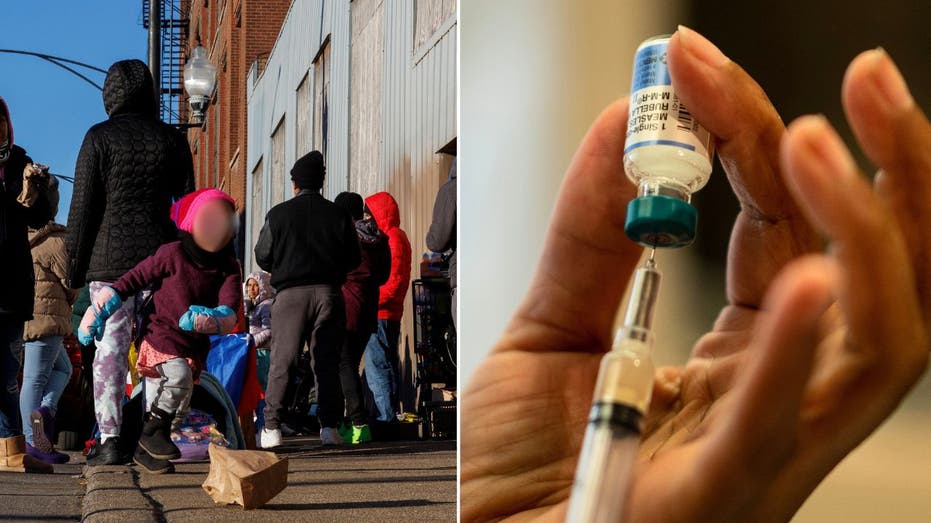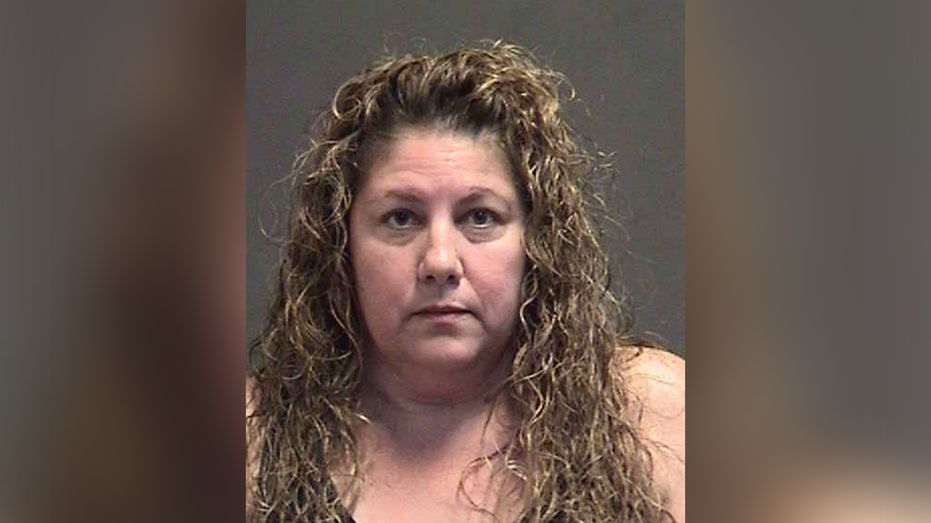Vaccinating migrants like US children would have prevented disease outbreaks at Chicago shelters: experts
The outbreak of measles and tuberculosis at Chicago migrant shelters could have been avoided if migrants were made follow the same health rules as U.S. citizens, doctors say.

The alarming outbreak of measles and tuberculosis (TB) at migrant shelters in Chicago could easily have been avoided if the illegal migrants had been vaccinated at the border and if they weren’t living in cramped conditions, two medical experts tell Fox News Digital.
Chicago health officials said Wednesday that a "small number" of TB cases were reported at some migrant facilities, following reports of dozens of measles cases at these facilities.
Concerns are quickly growing that these cases will multiply and spread to the general population in the Windy City. There are also fears that similar outbreaks could occur in other sanctuary cities such as New York, Boston and Denver — jurisdictions that are also packing migrants into makeshift shelters and hotels.
Unlike most U.S.-born children who have to follow strict vaccination schedules, migrant students were, up until last month, not required to be vaccinated in order to attend school in Chicago under an exemption for children living in unstable housing, according to reports. In New York City, migrant students were also given waivers at the start of the 2023-2024 school year.
READ MORE OF FOX NEWS' COVERAGE OF THE BORDER CRISIS
At least two students who tested positive for measles were living at Chicago's Pilsen migrant shelter, although it is unclear at the time of this publication if they had been vaccinated.
Amid the outbreak, Chicago moved to vaccinate all migrants at its shelters. Fox News Digital reached out to the Chicago Board of Education, the mayor’s office and the Chicago Department of Public Health (CDPH) about vaccination procedures and exemptions but did not receive a response.
Nearly 40,000 migrants have arrived in Chicago since August 2022, according to the city’s "New Arrivals Situational Awareness Dashboard." Migrants who are stopped at the border and then released into the general population are rarely medically screened or given vaccines. Legal migrants, like Green Card holders, are required to be vaccinated for a range of inoculations as part of their approval process.
Dr. Janette Nesheiwat, a New York City-based double board-certified doctor, says the outbreaks at the Chicago migrant shelters were easily foreseen.
"To be honest, I'm not surprised. We have open borders with all sorts of people coming in from countries from all over the world bringing in various illnesses, viruses, disease and bacterial infections," Nesheiwat says.
Measles is a highly contagious and serious airborne disease that can lead to severe complications and even death, especially in children. It is characterized by a fever as high as 105°F and malaise, cough, coryza and conjunctivitis followed by spots and a rash, according to the Centers for Disease Control and Prevention (CDC).
Tuberculosis, meanwhile, is also transmitted in airborne particles and typically affects the lungs but can also affect other parts of the body such as the kidney, spine, and brain.
The measles outbreak at the shelters could easily have been prevented if migrants were given the highly effective measles, mumps and rubella (MMR) vaccine, Nesheiwat says. However, the tuberculosis vaccine is generally not administered in the U.S. due to its low success rate. Instead, good hygiene and preventing people from living in cramped conditions is the best way to stop tuberculosis from spreading, she explains.
"Tuberculosis is a lung infection and one of the most common lung infections worldwide, it impacts millions of people," Nesheiwat says.
TUBERCULOSIS BREAKS OUT AT CHICAGO MIGRANT SHELTERS FOLLOWING MEASLES CASES
Tuberculosis cases jumped by around 1,300 cases last year to more than 9,600, the highest total in a decade, according to the CDC. As of March 28, there were 97 confirmed cases of measles in the U.S., shattering last year’s 58 cases total.
"You can catch tuberculosis if someone is coughing or sneezing or in close contact, the bacteria from those particles gets into the air and anybody nearby will breathe that in and that's how they pick it up and that's how they catch it," Nesheiwat says. "It's concerning to those who may have weak immune systems or who have underlying medical problems like asthma, lung disease, heart disease."
Tuberculosis is not as contagious as COVID, Nesheiwat says, and you would have to be around someone for a long period of time or be in crowded areas like shelters in order to catch it.
"The good news is we have treatment for it, but the not-so-good news is the treatment is for six to 12 months of treatment of multiple antibiotics," Nesheiwat says. "What's scary is that there are some strains of tuberculosis that are resistant to the typical antibiotics."
She also raised fears that migrants who are put on these medications may not follow through with the treatment, which could lead to pockets of outbreaks being replicated throughout the country, adding that it’s hard for health officials to keep tabs on their schedule.
Dr. Marty Makary, a Johns Hopkins health policy expert and surgeon, says conditions at the migrant shelters are now a public health concern given that tuberculosis can convert into a chronic disease with "a constellation of health complications affecting almost every organ system in the body."
"The reports of the crowding are that it is the worst it's ever been in recent history. We're seeing outbreaks in highly susceptible populations that are preventable," Makary explains. "One of the sort of basics in public health is that when people in a crowded area become sick, they should be separated. They should not be in close contact with others when they have no choice, then that is a recipe for an outbreak."
"However," Makary continues, "the amount of time spent in the shelter has decreased, suggesting that people may manifest the infection after their time in the shelter."
CHICAGO MAYOR URGES BIDEN TO GRANT WORK PERMITS TO HALF MILLION ILLEGAL IMMIGRANTS
He said that measles is typically not fatal, but can cause permanent health damage in the children who acquire it.
The MMR vaccine, while highly effective, does not provide instant immunity in the week in which it's administered, he says.
"So I think their issue in Chicago is they're discovering cases of measles after the fact," he explains. "I don't think there is a significant risk to the public, because most people are vaccinated against measles while tuberculosis requires some kind of direct interaction. But a migrant who is sick not only needs help, but they also need some degree of precaution."
Nesheiwat says a measles infection can lead to brain inflammation, blindness, deafness and pneumonia.
"You're protecting against serious, potentially life-threatening, infections or complications," Nesheiwat says of the MMR vaccine. "There is a high rate of effectiveness with these vaccines, so the outbreak was absolutely preventable."
Nesheiwat also says she has been giving shots to migrants attending public schools in New York City, where around 180,000 migrants have arrived since 2022. The city’s board of education tells Fox News Digital that students in temporary housing are still not asked for immunization records or immigration status before they enroll in schools, although they are required to follow the CDC’s immunization catch-up requirements.
A CDC report found that about 3% of children entering kindergarten in the 2022–2023 school year were given an exemption in their state — the highest level ever recorded.
With the recent spike in measles and tuberculosis, Nesheiwat says that people should be making sure they are getting their annual physical checkups in order to stay healthy.
"That's when we listen to your heart and your lungs and check your vital signs," Nesheiwat says. "And if you're having any symptoms like prolonged cough or fever, night sweats, chills, weight loss, see your doctor. Don't put it off, don't delay because the earlier we can begin treatment, the earlier we can diagnose you and the better the outcomes."



